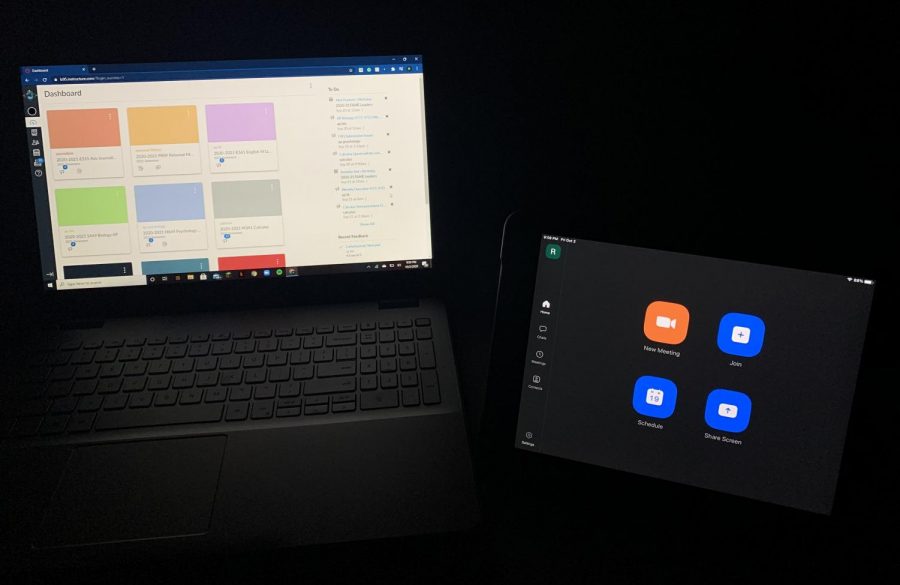Zoom Zzz’s
How “Zoom Fatigue” is affecting teachers
Photo by Ruby Lueras
What a typical set-up may look like for someone who is remote learning. Teachers, in particular, have found Zoom to be exhausting at times.
Zoom calls have become a near-daily occurrence for everyone at Lake Zurich. However, long hours staring at a screen has its downsides.
Although many teachers this year are more comfortable with the technology as compared to last year, teaching in this abnormal format is as tiring as ever, according to Rachel O’Connor, math teacher. She says she has found herself with less time than usual to get work done during the school day and now has to utilize more time outside of the school hours.
“During a normal school day, I might have a class and then have some time to grade or start working on tomorrow’s lesson. [During remote learning] all of that grading and planning happens outside of the school day,” O’Connor said. “So my nine to three o’clock is all zooms, but then I still have an inbox that’s full, I still have my speed grader, I still have my Canvas account full of submissions, there is still so much more to do.”
But in addition to tackling a seemingly never-ending list of tasks, teachers also say they feel alone in their work, and the isolation is making their jobs even harder.
“I’m very much a social creature. I like to talk to my students when they come into the room [but] with remote learning there’s just this awkwardness lingering. [For example,] asking a question and nobody responding,” Anne Hopkins, biology teacher said. “It’s a feeling of being on an island.”
The feeling of isolation is compounded by having to invent new ways to do what she has always done and constantly plan ahead for any mishaps, Hopkins says, and that is exhausting.
“I think a lot of people think all of these teachers [are] sitting at home and doing nothing,” Hopkins said. “Let’s face it, I am in my home, but mentally it is extremely draining. [Unlike a normal school day] I can’t run to the Xerox machine and copy something in the middle of a period and I can’t go and ask a teacher for help. I just have 35 minutes to teach [and] I better be ready to go.”
And if something goes wrong — perhaps an app crashes or students can’t access a document — Hopkins says she needs to have another plan. So now she says she has to have “three lesson plans ready to go in case one of them fails.”
While failure is a possibility, O’Connor says she tries to keep an optimistic attitude during these trying times.
“I view it as a challenge. It’s like a puzzle and at some point, we’re gonna figure out how all these pieces fit together,” O’Connor said. “I know we’ll get there eventually, all of us, the teacher, the students, and the administrators.”

As a senior, this will be Ruby's third year on staff and first year as LZ Life Editor. When Ruby is not in the journalism room you can find her running...

